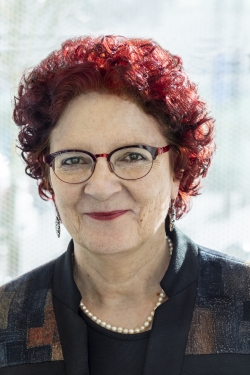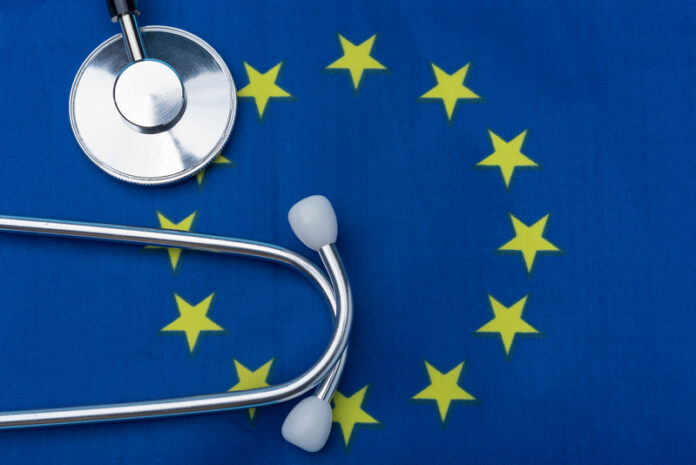«Lessons learned from the pandemic are not anymore at the top of the agenda in the actual political debate. I see it happening in many Member States in the European Union. For instance, colleagues in the national fields report that additional resources they got during the pandemic, have been taken away. They even had to reduce the staff». Dr Andrea Ammon, Director of the European Centre for Disease Prevention and Control (ECDC) in Stockholm, has tirelessly worked to strengthen the EU defence against infectious diseases during the last six years. She will soon retire, and the Management Board nominated Dr Pamela Rendi-Wagner as the next Director for five years (2024-2029).
«Lessons learned from the pandemic are not anymore at the top of the agenda in the actual political debate. I see it happening in many Member States in the European Union»
It’s been over a year since that public health emergency of international concern was declared over. Dr Ammon remembers those hectic moments when the display in the Emergency Operation Centre on the ground floor indicated a concerning PHE level for months. «The covid-19 pandemic was the biggest challenge the public health sector has ever faced in over 100 years».
The prevention of infectious diseases

Since the first breakout of covid-19 in the European Union in 2020 the world profoundly changed. And yet, there is still so much to do for disease prevention – both at the EU and the national level. «Based on our new Agency’s mandate, we did many assessment visits to the EU countries. We gave them recommendations for improving their healthcare systems and suggested preparing tailored action plans».
Looking ahead to the next European elections, according to Dr Ammon, the improvement of prevention healthcare systems should be a priority for the Member States, even if tailored solutions at the national level will require a continuous effort from many sides. First of all, essential will be to look closer at the budget of the Council of the EU and ask the national governments to dedicate part of the budget to healthcare prevention.«Especially during the last two and a half years, we’ve witnessed the willingness to spend more on defence, energy and climate change. It requires constant advocacy from the health side to the Finance ministers to get a budget for preparedness issues. On one hand, you now know people will tend to forget at some point, even the amount of deaths. On the other hand, there are so many other demands on the national budget for the Member States that health is sort of going down in the priority list».
The challenge of antimicrobial resistance
As highlighted by Dr Ammon, another challenge at the EU level remains antimicrobial resistance. «In three years, between 2019 and 2022, we experienced a worrying increase in resistance against some last-line antibiotics».
First of all, essential will be to look closer at the budget of the Council of the EU and ask the national governments to dedicate part of the budget to healthcare prevention
ECDC estimates that, on any given day in the EU/EEA countries, approximately 390.000 hospitalised patients receive at least one antimicrobial agent, and around 35.5% of patients received at least one antimicrobial agent in hospitals. The number was higher than the prevalence of 32.9% in the PPS 2016-2017. Finally, patients with healthcare-associated covid-19 and patients treated in covid-19 wards often received antibiotics.
According to a recent report published in May 2024 by ECDC, these numbers highlight the urgent need for further actions to mitigate this threat at the EU level. Dr Ammon stressed it many times: «By prioritizing infection prevention and control policies and practices, as well as antimicrobial stewardship and improving surveillance, we can effectively protect patients’ health».
What future in EU
And if covid-19 may be considered by some national governments as something to not care of in the future, a lot is still to be done to improve European health policies as a whole. Within the EU health and policy system, many experts are still discussing whether the prevention of non-communicable diseases should be put under the control of the ECDC or any other EU “executive” body.
In December 2022, the latest report on the State of Health in the EU Cycle by the Organization for Economic Co-operation and Development (OECD), addressed a number of behavioural and environmental risk factors that had a major impact on people’s health and mortality, highlighting the need to put again a greater focus on the prevention of both communicable and non-communicable diseases.
Even if the consensus on the importance of these topics rose all over Europe, Dr Ammon doesn’t seem confident of the perspective, because since the decision should be connected to additional resources to be dedicated to the Centre in case of extension of the Agency’s mandate, this won’t probably be the case at the moment. «If there would be a strong political consensus, this could happen fast» concluded Ammon.


